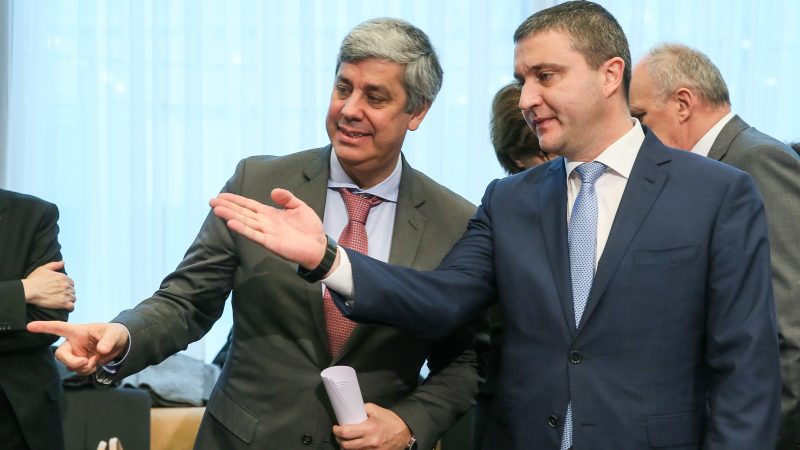
Euractiv (3 May 2018)
The Commission is proposing a new mechanism to protect the EU budget 2017-2021 from financial risks linked to deficiencies in the rule of law in member states. The move was expected in reaction to Poland, the first and only country so far to be subject of the “rule of law” mechanism, for what the Commission sees as a systemic risk for its democracy, as well as Hungary, which may follow, as it continues to institutionalise its “illiberal democracy”.
More widely, the conditionality could play in the case of the Visegrad countries (Poland, Hungary, Czech Republic and Slovakia), who refuse to be part of solidarity mechanisms to share the burden of the refugee crisis.
The new proposed tools would allow the Union to suspend, reduce or restrict access to EU funding. Such a decision would be proposed by the Commission and adopted by the Council through reverse qualified majority voting.
Poland reacted warily to the idea.
“There can be no space for arbitrariness,” Poland’s deputy European affairs minister Konrad Szymanski said in a statement.
But Szymanski, reflecting his government’s recent bid to resolve its two-year standoff with Brussels, said Warsaw did not see the proposals as “confrontational”.
Against EU treaties
Bulgaria, the country holding the rotating EU presidency, offered a stronger reaction.
Answering a question by the website Mediapool.bg does Bulgaria approve linking the disbursement of EU funds with the rule of law, Finance Minister Vladislav Goranov said:
“I can define the rule of law as the supremacy of the rules. It is not by accident that many philosophers believe that only the law can give freedom to any society. In this sense, we should not be against this. Another issue is if the rule of law is used to try to impose political interference or unequal treatment of individual countries – the principle of equal treatment is enshrined in the law also in the Treaty on the Functioning of the EU and if someone tries to impose regulation without rules, this is just as damaging as violating the rules.”
He added that Bulgaria would not comment further during its Presidency, as in its present role its duty is to seek consensus.
Romania is one of the countries to have rejected the idea of a EU funding conditionality since its inception, on the grounds that it doesn’t conform to the EU treaties.
In contrast, the Czech Republic, the country of Věra Jourová, who as Commissioner responsible for justice is behind the idea of the conditionality mechanism, made positive assessments regarding the proposed budget and the modalities of its allocation.
Czech State Secretary for EU affairs Aleš Chmelař said on Twitter the budget was “good news for the Czech Republic”
“There is more money for security, migration management, Erasmus and the space activities. The proposal also includes more flexibility within the cohesion policy. That was our priority.”
https://www.euractiv.com/section/future-eu/news/bulgaria-rejects-commission-plan-to-link-eu-funding-to-rule-of-law/
No comments yet.
- INDUSTRIAL SPILL AT BOSNIA FACTORY POLLUTES RIVER The Balkans 03.05.2018
- ARMENIA LAWYERS URGE CASSATION COURT PRESIDENT TO RESIGN The Caucasus and Turkish-Armenian Relations 03.05.2018
- YOUNG EUROPEANS BELIEVE IN THE EU, FEAR DONALD TRUMP Europe - EU 03.05.2018
- AMBASSADOR: ISRAEL, AZERBAIJAN ENJOY MULTILATERAL AND STRATEGIC RELATIONS The Caucasus and Turkish-Armenian Relations 03.05.2018
- MERKEL MAKES LAST DITCH EFFORT TO SAVE IRAN NUCLEAR DEAL Europe - EU 03.05.2018
-
25.01.2016
THE ARMENIAN QUESTION - BASIC KNOWLEDGE AND DOCUMENTATION -
12.06.2024
THE TRUTH WILL OUT -
27.03.2023
RADİKAL ERMENİ UNSURLARCA GERÇEKLEŞTİRİLEN MEZALİMLER VE VANDALİZM -
17.03.2023
PATRIOTISM PERVERTED -
23.02.2023
MEN ARE LIKE THAT -
03.02.2023
BAKÜ-TİFLİS-CEYHAN BORU HATTININ YAŞANAN TARİHİ -
16.12.2022
INTERNATIONAL SCHOLARS ON THE EVENTS OF 1915 -
07.12.2022
FAKE PHOTOS AND THE ARMENIAN PROPAGANDA -
07.12.2022
ERMENİ PROPAGANDASI VE SAHTE RESİMLER -
01.01.2022
A Letter From Japan - Strategically Mum: The Silence of the Armenians -
01.01.2022
Japonya'dan Bir Mektup - Stratejik Suskunluk: Ermenilerin Sessizliği -
03.06.2020
Anastas Mikoyan: Confessions of an Armenian Bolshevik -
08.04.2020
Sovyet Sonrası Ukrayna’da Devlet, Toplum ve Siyaset - Değişen Dinamikler, Dönüşen Kimlikler -
12.06.2018
Ermeni Sorunuyla İlgili İngiliz Belgeleri (1912-1923) - British Documents on Armenian Question (1912-1923) -
02.12.2016
Turkish-Russian Academics: A Historical Study on the Caucasus -
01.07.2016
Gürcistan'daki Müslüman Topluluklar: Azınlık Hakları, Kimlik, Siyaset -
10.03.2016
Armenian Diaspora: Diaspora, State and the Imagination of the Republic of Armenia -
24.01.2016
ERMENİ SORUNU - TEMEL BİLGİ VE BELGELER (2. BASKI)
-
AVİM Conference Hall 24.01.2023
CONFERENCE TITLED “HUNGARY’S PERSPECTIVES ON THE TURKIC WORLD"









